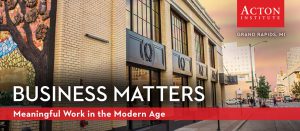


Like everything else in 2018, business has an emotional and often polarizing effect in our society.
There are, of course, legitimate stories of business behaving badly. One high-profile example: the Facebook and Cambridge Analytica debacle that thrust the social media giant into the spotlight with a data breach affecting 87 million users.
Cronyism remains alive and well, as witnessed by the Foxconn deal in Wisconsin. Cities are clamoring to win the coveted second headquarters location for Amazon, offering corporate welfare handouts at eye popping amounts.
But then there are stories that have less to do with bad business practices and more to do with identity economics. Consider the New Yorker piece written about the “creeping infiltration” of Chik-fil-A into Manhattan (expertly unpacked by Hunter Baker here on the Power Blog.) Or the emotional plea to “Save Barnes and Noble” – hat tip to Acton’s Dylan Pahman for explaining that there’s no need to get government regulators involved in a bookstore bailout.
It seems like the only thing that unites us is the general agreement that business matters. What we need is specificity on why it matters and how to ensure business continues to play its historic role in sustaining free and virtuous societies.
To address this broad chasm in understanding the role of business, you’re invited to participate, in person or online, in Acton’s ing conference on October 18, 2018 – Business Matters: Meaningful Work in the Modern Age. We’ve pulled together a slate of influential business leaders and entrepreneurs to address topics such as:
The theological underpinnings of workThe meaning and dignity of workThe role of the entrepreneurHow innovation makes business betterHow businesses help move people from poverty to prosperity
During this conference, we’ll also be debuting the newest episode in The Good Society short film series, focused on entrepreneurship.
To get a flavor for the conference, two of our guest speakers have also appeared on Radio Free Acton, the official podcast of the Acton Institute. Listen in on those conversations by following the links below:
Phil Sotok, Founder of DPMC North America, discusses purpose, fulfillment, and ethics in the workplaceMissy Wallace, Executive Director of the Nashville Institute for Faith + Work, discusses the connection between faith and work
To register for the full conference experience, including all sessions, food, and networking, visit the Business Matters registration page.
Or join us remotely with the free livestream of the event. Sign up here and we’ll notify you when we go live at 9:00 a.m. ET on October 18, 2018.









